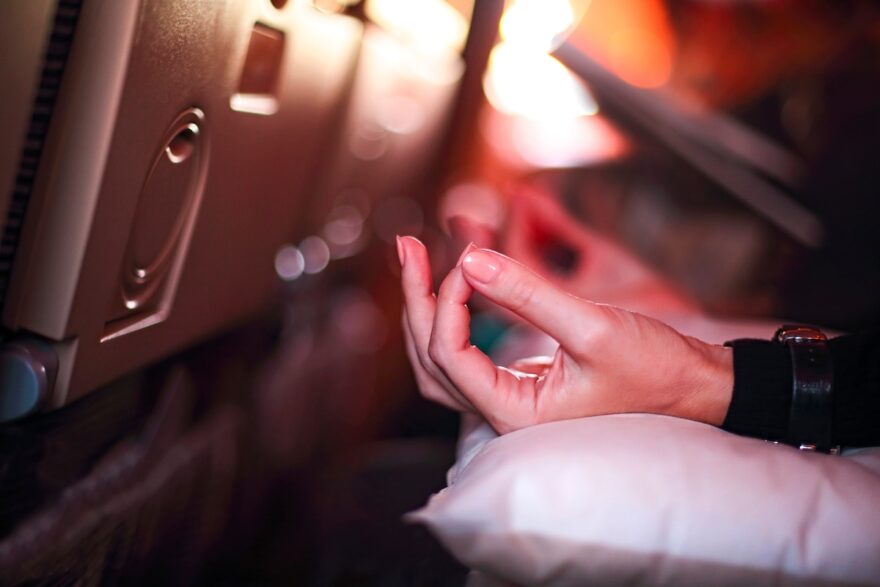How to survive long flights with anxiety
If flying makes you feel extremely anxious, can you really transform it into something you genuinely enjoy?

The great news is “yes, absolutely”. If you’re someone who expends energy and experiences extreme stress when thoughts of how to survive long flights with anxiety circle around your mind like an unfriendly Boeing 747 you probably find that hard to believe.
Whether it’s an otherwise exciting holiday or a lucrative business trip – the entire build-up to the flight there and the flight home can be anxiety-inducing to the extreme.
How to deal with flight anxiety
Long flight anxiety is a common issue that affects many travellers, making what should be an exciting or necessary journey a source of stress and discomfort. Before addressing how you can deal with flight anxiety, it is helpful to consider what causes it. Several factors contribute to it, ranging from psychological and emotional concerns to physical and situational factors.
Understanding these causes and implementing effective strategies can significantly alleviate the distress associated with long flights.
So, what are the factors that cause long flight anxiety?
Emotional
Fear of Flying (Aviophobia): A specific phobia that affects a significant number of people worldwide. This condition can range from mild discomfort to intense, debilitating fear, preventing individuals from flying altogether.
Lack of Control: The feeling of not being in control can be unsettling. Passengers have to rely entirely on the pilot and crew, which can be particularly difficult for those who have a strong need for control in their daily lives.
Fear of Crashes: Despite the statistical safety of air travel, the fear of a catastrophic event can loom large. Media coverage of rare but dramatic airplane accidents can amplify this fear.
Claustrophobia: Airplane cabins are confined spaces, and the thought of being in such a space for several hours can induce anxiety in those who are claustrophobic.
Lack of Mobility: Limited opportunities to move around can exacerbate feelings of being trapped.
Health
Deep Vein Thrombosis (DVT): Prolonged immobility can increase the risk of DVT, which can be a source of anxiety for passengers, especially those with pre-existing health conditions.
Dehydration and fatigue: The dry cabin air and disrupted sleep patterns can lead to dehydration and fatigue, contributing to overall discomfort and anxiety.
Psychological
Turbulence and unpredictable movements: Although turbulence is generally harmless, unpredictable movements can be frightening. The sensation of the plane shaking or dropping can trigger anxiety, especially for those unfamiliar with how benign and normal it is.
Sensory Overload with noise and crowds: The constant noise from engines and the presence of many people in a confined space can lead to sensory overload, increasing anxiety.
Unfamiliar Environment: Air travel can be unsettling for infrequent flyers because of the unfamiliar sights, sounds, and procedures.
Psychological stress and anticipatory Anxiety: The buildup of anxiety before the flight can be significant. Worrying about the flight for days or weeks in advance can heighten the actual experience of anxiety when on board.
Past Negative Experiences: Previous bad experiences with flying, such as severe turbulence or panic attacks, can lead to heightened anxiety on future flights.
Strategies to alleviate long flight anxiety
Preparation is key.
Choose Comfort: Selecting a comfortable seat, such as an aisle seat for more legroom or a seat over the wing for less turbulence, can make a significant difference.
Pack Smart: Bringing personal comfort items like a neck pillow, eye mask, and noise-cancelling headphones can help create a more comfortable and relaxing environment.
Relaxation techniques can really help
Deep Breathing: Practicing deep breathing exercises can help calm the nervous system. Techniques like the 4-7-8 method (inhale for 4 seconds, hold for 7, exhale for 8) can be particularly effective.
Mindfulness and Meditation: Using mindfulness apps or listening to guided meditations can help keep anxiety at bay. Focusing on the present moment can reduce the impact of anticipatory anxiety.
Knowledge is power
Understanding how planes work and the nature of turbulence can demystify the experience and reduce fear. Learning about the extensive safety protocols can also provide reassurance to those wondering how to survive long flights with anxiety.
Listening to updates from the flight crew can also help passengers feel more in control and informed.
Hydration and Movement
Drinking plenty of water before and during the flight can combat dehydration, a common issue in the dry cabin environment.
Regularly walking around the cabin, stranding stretches, and doing simple in-seat exercises can prevent stiffness and reduce the risk of DVT. Stretching exercises can also promote relaxation.
Engage your mind
Bringing engaging entertainment such as books, movies, puzzles, or games can help pass the time and occupy your mind with something enjoyable and fun, as can social interaction with other passengers or travel companions. Time flies when you’re having fun.
Professional help
For those with severe anxiety, cognitive-behavioral therapy (CBT) or exposure therapy can be highly effective. These therapies, and even better, Allen Carr’s Easyway help reframe negative thoughts and reduce fear responses.
In some cases, doctors may prescribe anti-anxiety medication or recommend over-the-counter remedies to help manage anxiety symptoms but if you get your frame of mind right, such things are unnecessary.
By recognizing the factors that contribute to long flight anxiety and implementing these strategies, travellers can significantly reduce their discomfort and make their flying experience more pleasant.
Whether through preparation, relaxation techniques, staying informed, maintaining physical well-being, enjoying entertainment, or seeking professional help, there are numerous ways to alleviate the stress associated with long flights.
Further reading:
- Men’s Health feature about how to survive long haul flights with anxiety
- Find out more about our Fear of flying course




